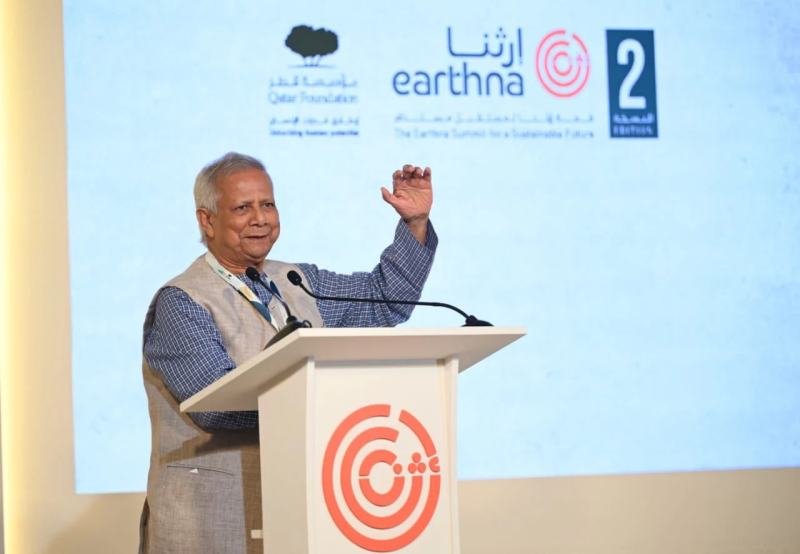- India Sees 9% Drop in Foreign Tourists as Bangladesh Visits Plunge |
- Dhaka Urges Restraint in Pakistan-Afghan War |
- Guterres Urges Action on Safe Migration Pact |
- OpenAI Raises $110B in Amazon-Led Funding |
- Puppet show enchants Children as Boi Mela comes alive on day 2 |
Yunus Proposes Six Steps for a Fair, Sustainable Future

Chief Adviser Professor Muhammad Yunus has outlined six key proposals for building a sustainable and equitable world, calling for united global action during his keynote address at the Earthna Summit in Qatar.
In his speech, Prof Yunus said the first step toward a just future is ensuring financial inclusion for all, particularly marginalised communities. By providing them with access to financial tools, individuals can build livelihoods and engage meaningfully in economic life.
Secondly, he advocated for social business as a transformative force in tackling social and environmental challenges—emphasising the need for enterprises that prioritise purpose over profit.
The third proposal focused on empowering youth as drivers of change. Prof Yunus stressed the importance of creating platforms for young voices and investing in their skills and potential.
His fourth point highlighted the global necessity of fostering peace and justice, describing these as essential foundations for sustainable development and the wellbeing of all humanity.
Fifth, he called on the international community to uphold its moral obligation in financing these efforts. Developed nations, he noted, must meet their commitments to Official Development Assistance (ODA), especially the target of 0.2% of Gross National Income (GNI) for Least Developed Countries, which currently stands at only 0.09%. He also advocated for increased concessional financing, including provisions for disaster-related disruptions, to support development momentum, particularly in graduating countries.
Finally, Prof Yunus proposed a shift in global culture toward a lifestyle rooted in zero waste, zero carbon, and zero personal profit. This, he said, can be achieved through social business—a non-dividend enterprise focused entirely on solving pressing social and environmental problems.
“The challenges we face are great, but so is our collective power to innovate, care, and act,” he said, reflecting on the urgency of global cooperation.
He praised Qatar for its leadership in hosting platforms like the Earthna Summit, which blends innovation, tradition, and partnership to address issues like climate change, inequality, and the future of work.
Speaking on Bangladesh, Prof Yunus said the country is at a critical crossroads—ready to forge a new social contract between the state and its people, especially its youth. This contract, he said, must be rooted in inclusion, justice, dignity, and opportunity.
He invited global partners to join in reshaping the future through inclusive development, calling for a stronger role for microfinance, financial inclusion, and social business in empowering the marginalised.
“Let us dare to build a world where no one is too poor to dream, and no dream is too big to achieve,” he concluded. “The future isn’t something we inherit—it’s something we create. And each of us has a role to play.”

